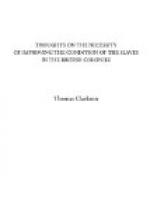That West Indian slaves, when they work for themselves, do much more in a given time than when they work for their masters, is a fact so notorious in the West Indies, that no one who has been there would deny it. Look at Long’s History of Jamaica, The Privy Council Report, Gaisford’s Essay on the good Effects of the Abolition of the Slave Trade, and other books. Let us hear also what Dr. Dickson, the editor of Mr. Steele, and who resided so many years in Barbadoes, says on this subject, for what he says is so admirably expressed that I cannot help quoting it. “The planters,” says he, “do not take the right way to make human beings put forth their strength. They apply main force where they should apply moral motives, and punishments alone where rewards should be judiciously intermixed. They first beslave their poor people with their cursed whip, and then stand and wonder at the tremour of their nerves, and the laxity of their muscles. And yet, strange to tell, those very men affirm, and affirm truly, that a slave will do more work for himself in an afternoon than he can be made to do for his owner in a whole day or more!” And did not the whole Assembly of Grenada, as we collect from the famous speech of Mr. Pitt on the Slave Trade in 1791, affirm the same thing? “He (Mr. Pitt) would show,” he said, “the futility of the argument of his honourable friend. He (his honourable friend) had himself admitted, that it was in the power of the colonies to correct the various abuses by which the Negro population was restrained. But they could not do this without improving the condition of their slaves, without making them approximate towards the rank of citizens, without giving them some little interest in their labour, which would occasion them to work with the energy of men. But now the Assembly of Grenada had themselves stated, that, though the Negroes were allowed the afternoon of only one day in every week, they would do as much work in that afternoon when employed for their own benefit, as in the whole day when employed in their masters’ service. Now after this confession the House might burn all his calculations relative to the Negro population; for if this population had not quite reached the desirable state which he had pointed out, this confession had proved that further supplies were not wanted. A Negro, if he worked for himself, could do double work. By an improvement then in the mode of labour, the work in the islands could be doubled. But if so, what would become of the argument of his honourable friend? for then only half the number of the present labourers were necessary.”




